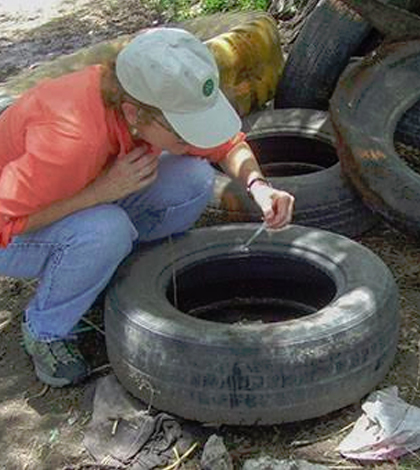NCAR Scientists Study Complexities Of Dengue Transmission Risk In U.S.

NCAR scientist Mary Hayden takes a water sample to test for dengue-carrying mosquitoes. (Courtesy of Mary Hayden / NCAR)
Scientists at the National Center for Atmospheric Research have been studying the issue of dengue transmission risk in the United States for more than a decade, according to a release from the agency. Their understanding of the sickness, which is spread through mosquito bites and marked by fever, headaches and joint pain, is a complicated mix of scientific disciplines.
Climate science can only explain so much of the risk for dengue transmission, researchers say, as the range of the Aedes mosquitoes responsible for its spread has recently shifted to more northerly regions in the United States. Covering the rest involves weather and disease monitoring, as well as studies using behavioral science techniques.
Much of the climate work involves modeling tactics. The weather monitoring deals with tracking temperatures, as dengue is more likely in warmer areas. On the behavioral side, scientists at NCAR work with the Centers for Disease Control and Prevention to track when cases of the fever are reported. Small field work components also help, as researchers take water samples where the mosquitoes breed.
Putting all of their efforts together, scientists with the agency say that it would take a perfect storm of many factors for the mosquito to thrive in the United States. These include climatic changes as well as human perceptions and behaviors.
Top image: NCAR scientist Mary Hayden takes a water sample to test for dengue-carrying mosquitoes. (Courtesy of Mary Hayden / NCAR)











0 comments